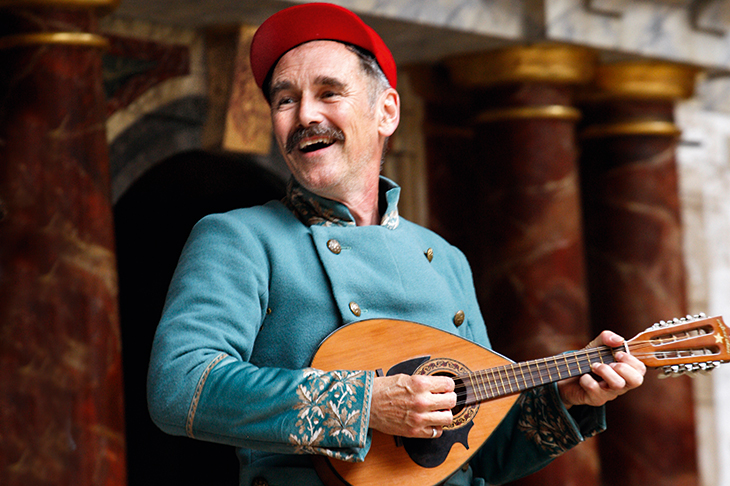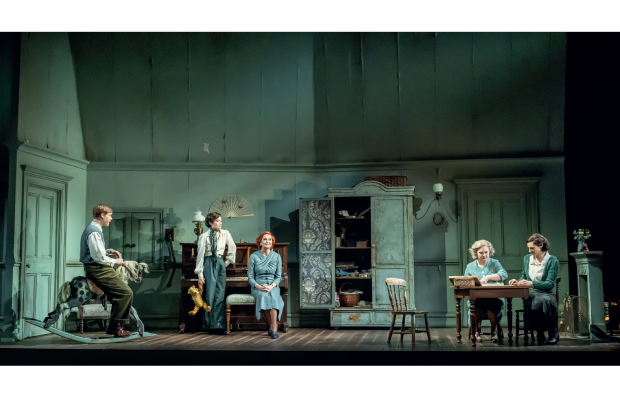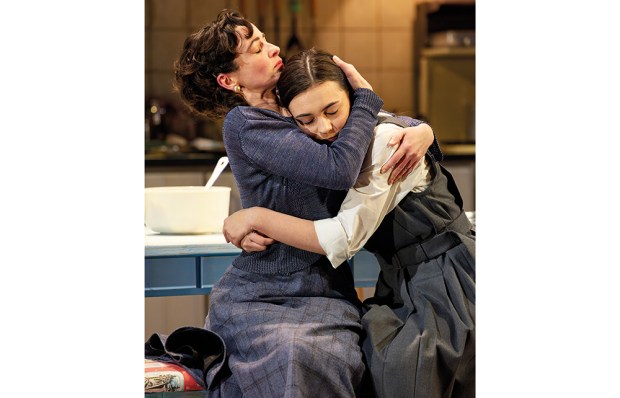It’s intelligent, enjoyable, beautiful to look at and funny in unexpected places, yet Othello at the Globe didn’t quite meet my sky-high expectations. The star should be the Moor but André Holland, from Alabama, can’t rival the magnetism of Mark Rylance (Iago). Holland’s diction is a strain for British ears. We’re used to hearing consonants bashed out — rata-tat-tat — like a rifle range, but his looser southern accent made some of his lines indistinct. Stately Jessica Warbeck lacks Desdemona’s impulsive streak and she plays her as a mature and self-possessed recipient of several Businesswoman of the Year awards. It was strange to see this matriarchal figure meekly assenting to Othello’s announcement, in Act V, that he was about to strangle her on the basis of fake news. I wanted Desdemona to punch him. I expect Warbeck wanted to as well.
The director Claire van Kampen, wife of Mark Rylance, has explored all kinds of minor details and come up with new solutions. In the opening scene, it’s clear from Iago’s body language that he’s concealing himself from Brabantio. When Roderigo arrives in Cyprus, he emerges from a trunk that stinks after the long voyage. Iago’s costume is an enjoyable confection of hints and clues. The grenadier’s cap and the toothbrush moustache suggest ‘the Austrian corporal’. The trousers are cut too high at the waist and too short at the ankle — a nod to vaudeville, perhaps.
Physically, Rylance presents Iago as a hyperactive ringmaster, scampering around the stage, stooping like Groucho, fine-tuning his plan and keeping its tattered details in order. What the performance lacks is any sense of Iago’s inner life or psychology. He deploys none of the charm, merriment or cordiality that an actor can use to humanise Iago and to make his deceitfulness plausible. Rylance plays him cold, as a capering automaton, a nerveless unit of evil programmed to pursue its destiny. Perhaps he was so disenchanted with the character that he decided not to give him a human pulse.
He’s well matched by Emilia (brilliant Sheila Atim) who, like Desdemona, is fully aware of her forcefulness and intelligence. Her astonishing saffron robe woven from rectilinear panels of swaying gold deserves to be exhibited in a museum. Some of the casting choices work against the play. Cassio should be a weak, handsome yuppie but he’s played by a wardrobe-sized bodybuilder, Aaron Pierre, who doesn’t look like the kind of excitable twerp who loses his cool after two glasses of Valpolicella. And because Pierre is black his presence destroys one of the play’s essential themes: Othello’s racial isolation in a white-dominated world. Other decisions are simply eccentric. Catherine Bailey plays Bianca (a prostitute), and the Doge of Venice. Having a female Doge ruins the moment when Othello strikes Desdemona in front of his peers. The blow is far more shocking if Desdemona is the sole female at an all-male gathering. That’s how Shakespeare conceived the scene and this interpretation, less powerful, cheats the viewer of its full and peculiar horror.
Pericles, Prince of Tyre, is a much-shunned classic. Having seen it once, in 1984, I might claim to be a world authority. The story follows a wandering prince who loses his family during a shipwreck and eventually finds happiness in a surprise ending that’s no surprise at all (reunion with his missing daughter).
Director Emily Lim convinced the National to give her the Olivier for a pageant involving 233 actors, musicians and members of community groups. Chris Bush adapted the script, which remains faithful to the original while allowing space for a few modern flourishes. Useful idiot boards at the side of the stage help viewers to keep abreast of the occasionally garbled line.
The atmosphere on-stage is informal and welcoming, more village hall than Shaftesbury Avenue, and the show has so many distractions that the distractions become the show. There are gymnastics displays, Indian drummers, gospel singers, a ska band, the London Bulgarian choir, a hip-hop expert doing Michael Jackson routines, and a kiddie group of kazoo players who seem barely old enough for primary school.
How about the budget? Enough, I’d guess, to fund a moon shot or a new maternity suite but this represents great value because the National has stumbled on an undiscovered genre: a blend of Shakespeare, music hall and the all-comers talent show. Rarely have I seen the Bard received with such natural and unforced pleasure. And the youngsters who witnessed this will — thank God — forever view Shakespeare as an amusement, not a punishment.
Two minor quibbles. At nearly two hours, the show needs an interval. And more use might be made of the star, Kevin Harvey (Boult), whose amused hauteur and purring voice evoke the shade of Noël Coward. Let’s hope this nutty but brilliant experiment becomes a permanent fixture in the NT’s calendar.
Got something to add? Join the discussion and comment below.
Get 10 issues for just $10
Subscribe to The Spectator Australia today for the next 10 magazine issues, plus full online access, for just $10.
You might disagree with half of it, but you’ll enjoy reading all of it. Try your first month for free, then just $2 a week for the remainder of your first year.














Comments
Don't miss out
Join the conversation with other Spectator Australia readers. Subscribe to leave a comment.
SUBSCRIBEAlready a subscriber? Log in